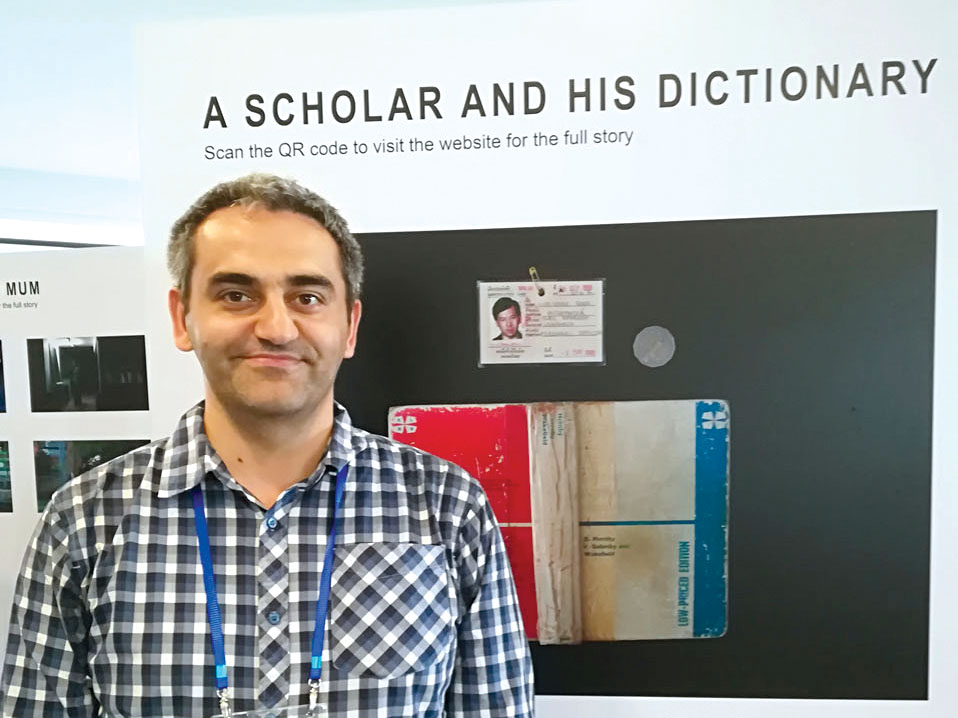
Photo: ASP Archive
Sosse Baloian
Staff Writer
“One cannot change the future without understanding the past,” stated Tatiana Samouie, a Biology major and expected 2022 Fresno State graduate. As a great grandchild of an Armenian Genocide survivor, Samouie believes that “learning about multiple genocides can provide an individual with an acute lens when looking at global issues.”
Samouie is one of several students enrolled in a course, “Introduction to Genocide Studies” taught by Dr. Suren Manukyan, Kazan Visiting Professor in Armenian Studies at Fresno State for the Fall 2021 semester.
As Fresno State students log into the Zoom class meeting at 2:00PM on Tuesdays and Thursdays, Prof. Manukyan is joining in simultaneously from Armenia at 1:00AM in the morning. Teaching a course in a different time zone than the students can be difficult, but Prof. Manukyan’s enthusiasm for the topic masks his tiredness.
Zoom classes are different from in-person classes mainly because “the students’ reactions are not noticeable,” said Prof. Manukyan. “When teaching in person, you can see into the students’ eyes and understand what they grasped and what needs to be clarified.” He overcomes this challenge by assessing students’ interests and evaluations by initiating discussions.
Prof. Manukyan’s course introduces students to the phenomenon of genocide—the causes, and preconditions that lead to genocide and the process of its implementation. He discusses in the class how prejudice, racism, chauvinism, anti-Semitism, and indifference can lead to mass atrocities and how modern societies can confront this disaster. While explaining what the consequences of genocide are and its impact on societies, Prof. Manukyan discusses how the memory of genocides is transmitted today in relation to the social, cultural, and collective memory, to state and nation building processes.
Prof. Manukyan believes that genocide education “arms the younger generation with knowledge… they can reflect on issues ranging from causes and consequences of geopolitical clashes, international conflicts, and violence to subjects of peace, security, and justice.” Unfortunately, genocide is a choice. It happens suddenly and people are not properly trained to act in an emergency at the time of genocide. Because of this lack of training, many individuals “become bystanders not because they are bad people, or because their conduct is a result of rational consideration, but because they do not know what to do, how to react.” Fortunately, education in genocide studies teaches “important models and demonstrates patterns that can be applied to dealing with future threatening conditions.”
One of the first documents Prof. Manukyan introduced to the class was the “Convention on the Prevention and Punishment of the Crime of Genocide” adopted by the General Assembly of the United Nations on December 9, 1948.
“It was interesting to discover that some actions qualify as genocide that are not just about directly killing individuals of a group,” said Ani Zhamkochyan, a third year Political Science major. “If the children of that group are forcibly removed and births are prevented, that is also considered genocide under the UN Convention.”
Prof. Manukyan’s course will cover four cases of full-scale total genocide in the 20th century: the Armenian Genocide, the Holocaust, the Rwandan Genocide, and the Cambodian Genocide. He also plans to discuss the Herero genocide, Nankin massacre, and the examples of Bosnian and Darfur.
Khori Cranford, a third year Political Science major, decided to take this course to expand her knowledge of genocides all over the world. “While I have grown up learning about the Armenian Genocide, there have been many other groups of people who have suffered similar injustices and pain all over the world,” said Cranford.
Ulysses Ochoa, is majoring in English and is in his first semester at Fresno State. He decided to take this course in order to “be better in touch with what is happening in the world as even today genocide is still occurring.” Ochoa was surprised to learn “how little perpetrators of genocide are punished for their atrocities.”
Prof. Manukyan explained that one of the challenges of teaching genocide “is to be overcome by the senses because genocide is a terrible crime and a tragedy that provokes many emotions – fear, compassion, regret, anger, even trauma and those can repel the researcher or student.” He attempts to “display the spiritual essence of the phenomenon” and encourages those who study genocide to show composure and a scientific spirit.
“The Armenian Genocide is not only a part of Armenian history but also part of world history,” stated Prof. Manukyan. “We are struggling for the recognition and condemnation of the Armenian Genocide, but it is an impossible task if we isolate ourselves from the world and do not try to manifest Armenian history as a tragedy for all humanity. The Armenian Genocide must become part of world memory. Additionally, if we assume that the Genocide happened only to Armenians, it would be an unspeakably great psychological blow for the Armenian people. By comparing it with other genocides, understanding that genocide is a cruel scourge of all humankind, we leave the possibility of hope and faith that it is possible to restore historical justice and perhaps prevent such crimes in the future.”
 Hye Sharzhoom Armenian Action
Hye Sharzhoom Armenian Action